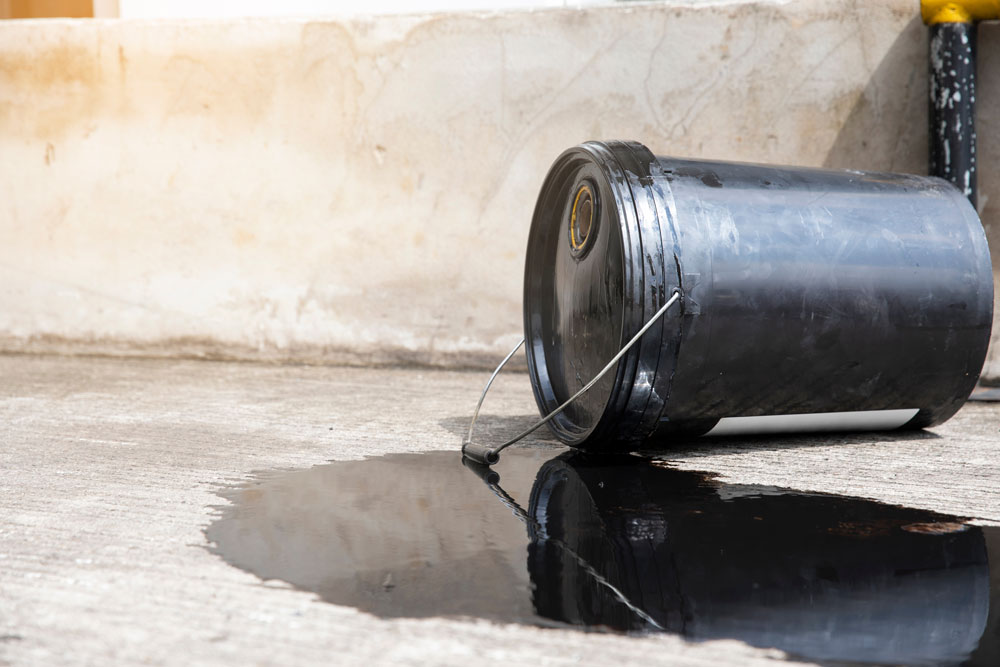How To Prevent Oil Spills
 CONTENTS
CONTENTS
- Four ways to prevent oil spills from happening
- Why is preventing oil spills so important?
- What should you do when an oil spill happens?
- Contact us today
Oil spills can be devastating incidents that bring operations to a halt, put your employees in danger, and damage your property. If you want to make sure this does not happen to your business, you need to have preventative measures in place, and a response plan just in case.
Should a spill happen, ICE Cleaning can be on site in an hour to clean up and dispose of any spilled oil. Our technicians are fully permitted to handle any kind of spill, including surface and water spills. They are available 365 days a year, 24 hours a day, 7 days a week.
Keep reading to find out the best ways to prevent oil spills and leaks.
Four ways to prevent oil spills from happening
Regularly inspect your equipment
It is recommended you review the condition of your containers, secondary containment systems, pipework, and other equipment weekly. Containers with a capacity of 55 gallons will need integrity testing too. Make sure you report all audits to an inspection log.
Issues that could cause oil spills must be reported to the appropriate personnel. This includes:
- Leaks and holes in seams, valves, hoses, or containment basins
- Signs of dripping, or drip marks
- Corrosion
- Spraying and splashing
- Pooling or puddles
- Tight connections
Create an action plan based on spill history
To prevent spills, you need to know what is likely to cause them in your workplace. Review spill history for each piece of equipment, work area, and walk area to identify any patterns in incidents and determine problem areas.
If certain pieces of machinery have a history of leaks, you can put in place specific measures for the equipment and have a more effective response plan. You should interview the employees who use oil to find out what they think is likely to cause spills, as well.
Use less oil
To decrease the chances of large leaks, reduce the amount you have on site. One way to do this is to try lean manufacturing techniques so the oil is only delivered when it is required. This will also help encourage more efficient operations in your business.
Conduct frequent oil spill response training
No matter how many preventative measures are in place, spills still happen. A rapid, thorough response is critical to minimising the risks to you and your employees’ health, and getting your business back up and running as soon as possible.
You should frequently review, update, and practice your emergency spill procedure. Your co-workers should also receive training in it, like when it is updated.
Why is preventing oil spills so important?
When spills and leaks happen, it can make your workplace a very dangerous place, and even cause pollution depending on the size of the spill.
Not only does oil make floors slippery which could cause injuries, exposure can cause headaches, nausea, memory loss, and skin injuries. Should someone touch it, they can experience burns and swelling. Chronic exposure causes more serious conditions, like organ damage and cancer.
Oil is also highly flammable, so ignitions and heat sources can cause a fire to breakout. This obviously threatens the safety of your employees and might damage your property.
There is a risk of oil spills contaminating soil or polluting water sources, too. The impacts of oil in the ocean are well documented, and it can have similarly devastating effects on wildlife on land, as well as smaller bodies of water.
- The toxic vapours can make animals sick if inhaled. When they attempt to clean the oil off of themselves, they can ingest it, which harms their health.
- It stops water absorption by the soil, stunting plant growth and reducing crop yields.
- The falling plant and animal populations can disrupt food chains and destroy ecosystems.
- If the oil contaminates groundwater or surface water – our water supply - we can ingest it and experience stomach upsets, nausea, and diarrhoea.
What should you do when an oil spill happens?
You must follow your response plan quickly and thoroughly. This should include alerting your employees and the authorities that a spill has occurred, stopping the oil from spreading, containing it, and then clearing it up.
You should not attempt oil remediation yourself unless you have training, PPE, and specialist equipment. Otherwise, hire professional cleaners to clear up and dispose of the oil. They will then decontaminate the area to ensure all traces have been removed and it is safe to work in again.
Contact us today
Our technicians can clean up any oil spill, including gasoline, diesel, and hydraulic oil. They are available nationwide, and can be on site in an hour in an emergency.
Get in touch with our team on 0208 066 0360 or enquiries@icecleaning.co.uk to get a free site survey and no-obligation quote for our oil spill cleaning services.

Speak with me today,
I’m here to help
By asking you a few questions either via phone or email I can immediately provide a realistic estimation of the cost.
You’re in good company. We’ve cleaned for the following commercial clients… View all

Why choose us?
- Cater to a wide variety of cleaning situations
- Nationwide coverage, available 24/7
- Cater to commercial and domestic clients
- Free survey provided prior to quotation
- Emergency response team
- Offer a bespoke service designed to suit all your needs
- All technicians hold professional health and safety qualifications, including BICSc, IOSH, Dewpoint Professional & Safe Contractor
We’re fully accredited
We place best practise, professional expertise and health and safety at the core of our business. We’re fully compliant with all legal obligations. You can view a list of our accreditations below, or visit our Health & Safety page for more information.











-RGB-small.1707319151.jpg)




















